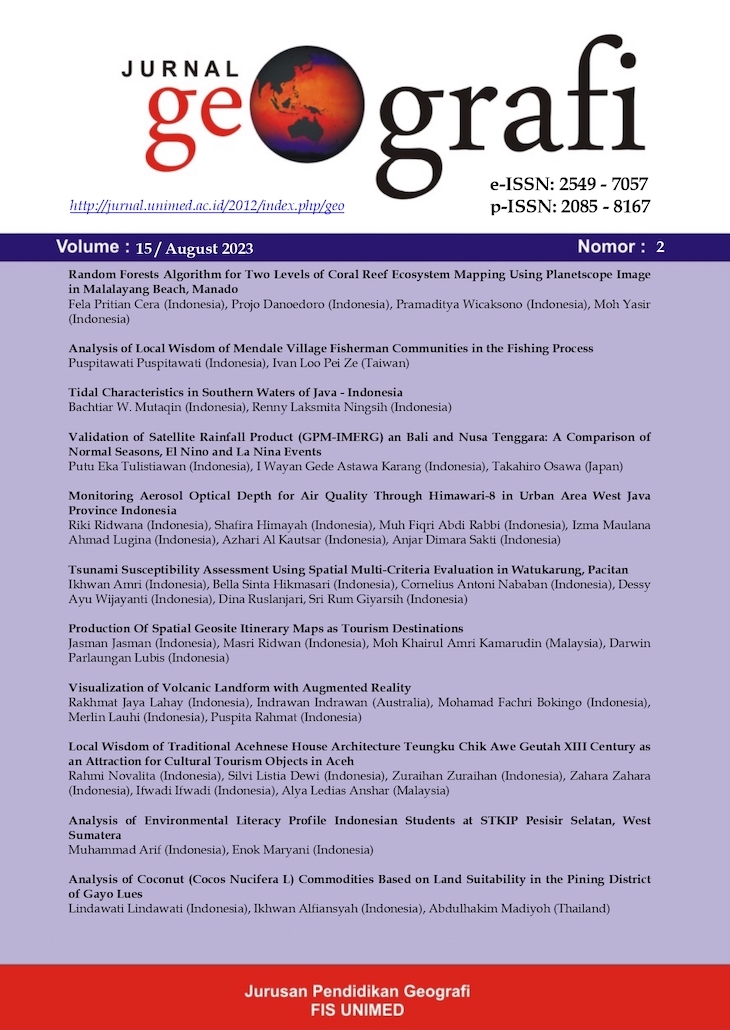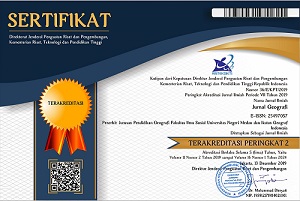Analysis of Coconut (Cocos Nucifera L) Commodities Based on Land Suitability in the Pining District of Gayo Lues
DOI:
https://doi.org/10.24114/jg.v15i2.44720Abstract
Using a survey method, this study aimed to examine the characteristics of the land and the direction of land usage for cultivating coconuts. The land's features are described in a land map created from the overlapping findings of each land map unit, which serves as a foundation for additional study to fit the environment for growing coconut plants. According to the results of the analytics and planning of the land conservation of coconut crops in Gayo Luwes, for the crops to survive, it is vital to pay attention to soil characteristics such as temperature, rainfall, soil type, and the number of wet months. Gayo Luwes District is a coconut region in the centre of the country. Not only were the results of matching for the coconut commodity in each SST obtained by using map-based planning geographic information systems, but it was also discovered that rainfall ranged from 3100 mm/year, temperatures went from 23oC to 24oC, base saturation was in the very low to low category (3.91% -35.16%), pH H2O is classified as acidic (4.6-4.9), drainage is slightly obstructed, relatively fast and good, slopes are sloping to steep (12%-26 ) and textures with values little fine, smooth and rather rough are the limiting factors dominant. Other findings also suggest that applying organic material in garbage and compost to Red Yellow Podzolic soil in Batanghari, Jambi, increases Ca-dd and base saturation, and liming is done to raise the pH of H2O in soil units. Moderate to high levels of management can improve the slope limiting factor, such as delaying erosion, establishing a terrace, planting according to the contour, and growing covering plants. Irrigation and irrigation systems can assist in increasing the factors that limit rainfall. Keywords: Development, Coconut, Land Suitability, Gayo LuesReferences
Astuti, W., & Paksi, A. K. (2022). A Study about Indonesia's Crude Coconut Oil as Export Commodity. International Journal of Multicultural, 402-411. http://dx.doi.org/10.18415/ijmmu.v9i9.4142
BPS. (2021). Kabupaten Gayo Lues Dalam Angka 2021. Gayo Lues Aceh: Badan Pusat Statistik.
Djaenudin, D., Marwan, H., Subagjo, H., dan A. Hidayat. (2011). Petunjuk Teknis Evaluasi Lahan Untuk Komoditas Pertanian. Balai Besar Litbang Sumberdaya Lahan Pertanian. Badan Litbang Pertanian. Bogor
FAO (Food and Agriculture Organization). (2008). Fisheries and Aquaculture Circular No. 1034: A Review on Culture, Production and Use of Spirulina as Food for Hufors and Feeds For Domestic Animals and Fish. Rome: ISBN 978-92-5- 106106-0.
Mather, US. (1986). Land Use. Longman Group UK Limited. New York.
Mardesci, H. (2019). Identification of Prospective Products for the Development of Integrated Coconut Agroindustry in Indonesia. International Journal on Advance Science Engineering Information Technology, 511-517. http://dx.doi.org/10.18517/ijaseit.9.2.7172
Mawardati, Jullimursyida, Suryadi, Kembaren, E. T., & Sinta, I. (2022). Prospects for the Development of Coconut and Oil Palm Commodities in Community Plantations in North Aceh Regency. Universal Journal of Agricultural Research, 722-730. http://dx.doi.org/10.18517/ijaseit.9.2.7172
Mujiyo, M., Romdhati, F., Widiyanto, H., & Herawati, A. (2021). Land Suitability Evaluation for Banana In Jenawi District, Karanganyar, Indonesia. Agroland The Agricultural Sciences Journal (E-Journal), 60-71. http://dx.doi.org/10.22487/agroland.v8i1.903
Nurmiaty, & Yassin, B. D. (2019). Evaluasi Kesesuaian Lahan Tanaman Karet (Havea Brasiliensis) Di Kecamatan Tondong Tallasa Kabupaten Pangkep . J. Agroplantae, 23-32. https://doi.org/10.51978/agro.v8i2.76
Paendong, S. M., Antara, M., Susrusa, K. B., & Suamba, I. K. (2020). Institutional Development of Coconut Agribusiness in North Sulawesi Province. International Journal of Life Sciences, 8-18. https://doi.org/10.29332/ijls.v4n1.385
Qanun Number 15 of 2013. Gayo Lues District Spatial Plan for 2012 - 2032. Gayo Lues Regency. Blangkejeren
Raju, M. (2022). Awareness And Promotion Schemes Of Predicting India's Coconut Cultivation: A Survey. Journal Of Northeastern University, 2997-3006.
Rencana Tata Ruang Wilayah (RTRW) Kabupaten Gayo Lues 2012(https://bappeda.gayolueskab.go.id/dokumen-perencanaan/rencana-tata-ruang-wilayah/
Riza, S., Sekine, M., Kanno, A., Yamamoto, K., Imai, T., & Higuchi, T. (2022). Land suitability analysis for agricultural land use using hyperscale DEM data. AGRIVITA, Journal of Agricultural Science, 44(2), 187-198. http://doi.org/10.17503/agrivita.v44i2.2985
Sadonoa, R., Soeprijadi, D., & Wirabuana, P. Y. (2019). Kesesuaian lahan untuk pengembangan tanaman kayu putih dan implikasinya. Journal of Natural Resources and Environmental Management, 43-51. http://dx.doi.org/10.29244/jpsl.10.1.43-51
Silalahi, C. A., Suaidah, & Silalahi, A. D. (2023). The Influence Of Increased Prices Of Satisfactions On Economic Growth. International Journal of Economics, Business and Accounting Research (IJEBAR), 1-9. http://dx.doi.org/10.29040/ijebar.v7i1.7227
Sirappa, M. P., & Susanto, E. D. (2010). Land Suitability and Purposed Land Use of Selaru Island, West-Southeast Moluccas Regency. J Trop Soils, 169-178. http://dx.doi.org/10.5400/jts.2010.v15i2.169-178
Suheri, N. A., Mujiyo, & Widijanto, H. (2018). Land suitability evaluation for upland rice in Tirtomoyo district, Wonogiri Regency, Indonesia. Journal of Soil Science and Agroclimatology, 46-53. https://doi.org/10.15608/stjssa.v15i1.21670
Sutono, S., A. Abdurachman, and I. Juarsah. 1996. Red Yellow Podzolic Soil Improvement (Haplorthox) Using Organic and Inorganic Materials: A Greenhouse Experiment. Pros. Meeting on Discussion and Communication of Soil and Agro-climate Research Results. Puslittanak.
Syarifuddin, S. (2022). Coconut-Based Community Economic Development Strategy In Indragiri Hilir Regency. I International Journal of Business and Social Science, 13-21. https://doi.org/10.54099/aijbs.v2i1.106
Uristiati, Hakim, R., & Kasimin, S. (2019). Specific zone and development strategy of local coconut plantation in Aceh Besar regency. IOP Conf. Series: Earth and Environmental Science, 1-8. https://doi.org/10.54099/aijbs.v2i1.106
Wulandari, J. C. (2019). Present status and outlook of coconut development in Indonesia. IOP Conf. Series: Earth and Environmental Science, 1-11. https://10.1088/1755-1315/418/1/012035
Yusuf, J. G., & Yusron, d. M. (2021). Revitalisasi Pengembangan Ekonomi Kawasan Kelapa Di Sulawesi Utara. Jurnal Penelitian dan Pengembangan Pertanian, 44-57'. https://repository.pertanian.go.id/handle/123456789/8953
Zulkarnain, & Hartanto, R. N. (2020). Analisis Kesesuaian Lahan Untuk Pertanian Pangan Berkelanjutan Di Kabupaten Mahakam Hulu. Jurnal AGRIFOR, 347-357. DOI: http://dx.doi.org/10.31293/af.v19i2.4809
























